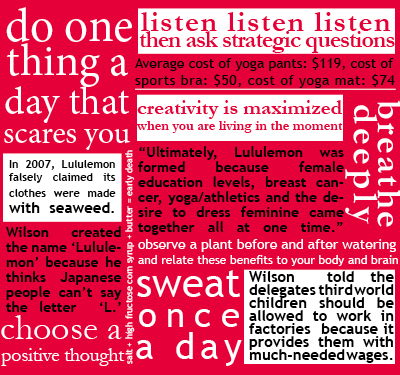
Lululemon athletica prides itself in selling more than merchandise. For just $98, customers can take home a pair of yoga pants and a sparkling new lifestyle, too. Talk about a steal, right?
Given the pants are only about $40 at cost, I suppose that depends on the quality of lifestyle lululemon is selling. There’s no denying the products are reliable, I wear them myself. They’re comfortable, durable and trendy. At face value, the company is a thriving success that serves to motivate and inspire healthy lifestyle. However, I couldn’t help but wonder what goes on behind the seams.
Are the ethics of lululemon as reliable as its pants? Not exactly.
Dennis “Chip” Wilson founded lululemon in 1998. He’s a Canadian businessman who worked in the ski and snowboard industry prior to launching his own brand. In 2000, the first lululemon store opened in Vancouver.
Wilson’s initial vision for the company, according to lululemon’s website, was to be “a community hub.”
But the yoga shop’s revenue began to multiply and never stopped. According to lululemon, it was a matter of grow or die. Today, it’s the biggest yoga-inspired retailer in the world. Fastcompany.com reported the company made $452.9 million in net revenue for fiscal 2009. That’s up 28 percent from 2008.
The company’s catapult to success could be credited by its ability to localize its product, despite major expansion.
The ambassador program is used to advertise yoga gear at an arm’s length. Lululemon store employees invite local fitness instructors to wear merchandise during classes at popular studios like CorePower Yoga in exchange for brand feedback. The ambassadors also host free yoga sessions around the community. 
However, Wilson’s theory is a little different.
“Ultimately, lululemon was formed because female education levels, breast cancer, yoga/athletics and the desire to dress feminine came together all at one time,” Wilson said.
Wilson also credited Ayn Rand, author of “Atlas Shrugged,” with inspiring the values of lululemon. The book suggests that the naked pursuit of self-interest should be society’s highest ambition.
Such drive has clearly been woven throughout the company, most visibly in its staff.
“When we first started, we hired nothing but yogis,” Wilson told Fast Company in 2009. “But it didn’t work because they were too slow. So, we started hiring runners who like yoga. They’re more on the ball, more type ‘A.’”
Unfortunately, Wilson applies his individualist ideals to more than just personal health. He openly supports child labor in third world countries. According to The Tyee, he argued that even in Canada, there’s a place for 12- and 13-year-old street youths to find work in local factories.
I know yogis have been known to put a foot in the oddest places, but their mouths? That’s a pose Wilson has mastered.
Faced with the enormous task of providing enough merchandise for his worldwide clientele, Wilson made the “do or die” decision to manufacture everything in the Orient offshore.
Before anyone could speculate that lululemon was engaging in unethical behavior overseas, Yoga Journal Magazine published a lululemon ad mocking the way society villainizes major corporations.
According to The Tyee, the ad was a fake newspaper article that featured adults dressed in diapers, with bonnets and pacifiers, at sewing machines. Attached to the article is a post-it note from Chip asking, “How did this get out?”
An interesting source of entertainment, Wilson. Almost as entertaining as the logic behind lululemon’s catchy moniker. It was one of 20 brand name options, decided upon by a survey of 100 people.
According to Business Insider, in 2009 he wrote, “By including an ‘L’ in the name, it was thought the Japanese consumer would find the name innately North American and authentic.”
Why? Because the sound of the letter “L” does not exist in Japanese phonetics.
“It’s funny to watch them try and say it,” Wilson said.
I wonder if racism has always been key in successful marketing?
This is the lifestyle you’re buying for $98. These are the values you’re affirming, not the ones sprinkled across bright red bags. If I could buy the pants without the ethical implications, I would. Unfortunately, it’s a package deal. An unhealthy one at that.
Carly Samuelson can be reached at samu5380@stthomas.edu.


This is an impressive article, especially for TM. Well researched and well argued. If only the headline was stronger. Regardless, good work Carly.
So do you still buy the product because you like it, even with the ethical implications? I would think if the issue didn’t directly affect a consumer (for example, they are not Japanese) they might tend to brush the issue under the rug and justify buying the product.
Great article. Not surprised by the negatives of the company. I’m glad that I never supported Lululemon!
I’d like to know more about his philosophy on supporting child labor. While I am not here to suggest what happens everyday in Asia is ethical, I think a conversation about the value of work being instilled at a young age is a legitimate one to have. The farming lifestyle is just one example of where I think it is extremely beneficial for a child to grow up learning what hard work & dedication means. Today’s American society enables & spoils kids to the point where they believe they are entitled to get whatever they want. So instead of enabling, we should be looking for safe opportunities for children to be more involved & active in work experiences at a young age.
@Lauren: I’m sure that is the exact logic Wilson uses to justify the exploitation of children in Asia. The type of labor that Wilson is supporting isn’t a 15 year old with a part-time job; it’s an 9 year old working 12 hour days in horrible conditions. Child labor historically developed out of necessity, and poverty is still the primary reason for its existence. Many American families are financially lucky enough that the children don’t need to work, so they don’t. Spoiled children are the result of poor parenting, so how is making children work in any way a logical solution? Fix the parents. There are other ways to instill a good work ethic: encourage hard work in academics, in athletics, in household chores, etc. Let kids be kids. There’s a reason organizations like the UN have issued international conventions regarding child labor. But Wilson and Lululemon don’t seem too concerned about that.